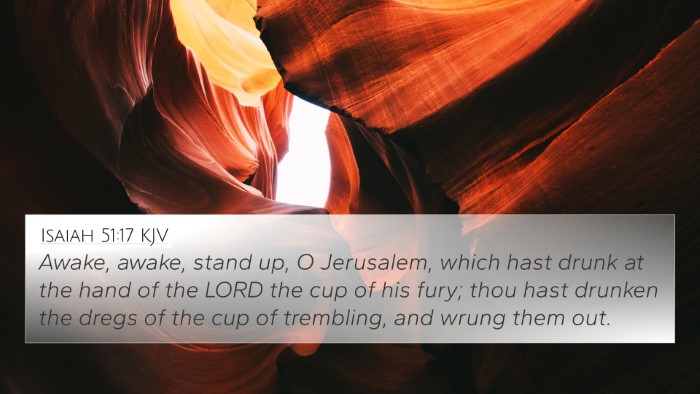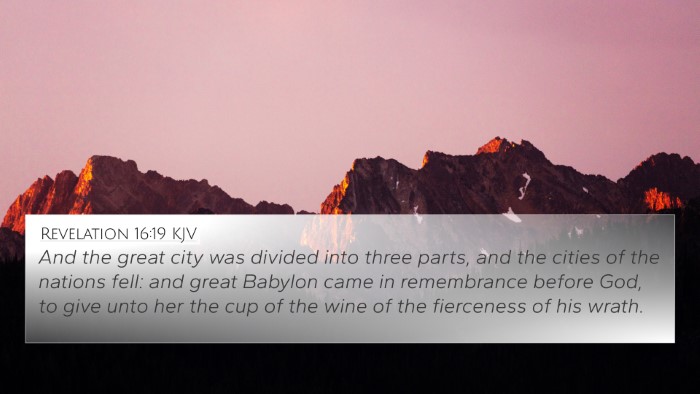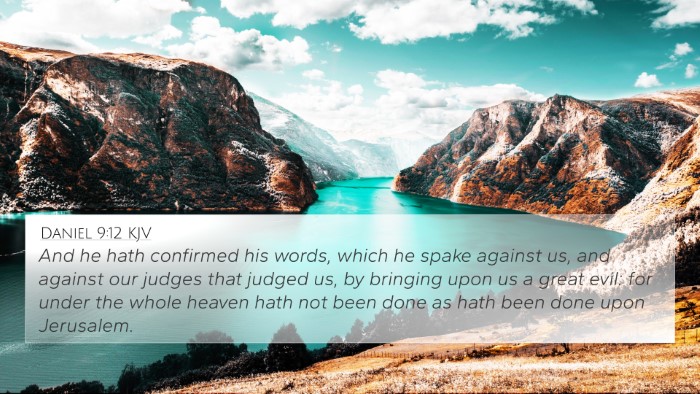Psalms 60:3 - Understanding the Verse
Psalms 60:3 states: "You have shown your people desperate times; you have given us wine that makes us stagger."
This verse reflects a profound sense of distress combined with a poignant metaphor of intoxication as a representation of the overwhelming trials faced by the Psalmist. The lament illustrates not only the physical turmoil but also the emotional and spiritual anguish encountered during this time.
Verse Context and Analysis
The Psalm is attributed to David and is set during a time of conflict and national distress. The initial verses (Psalms 60:1-2) describe God's withdrawal and the reasons for the calamity that has befallen Israel. The mention of "desperate times" signifies significant adversity—perhaps a war or political upheaval. Through this imagery, we see how the Psalmist grapples with understanding the nature of God's disfavor and the consequent suffering of His people.
Insights from Public Domain Commentaries
-
Matthew Henry:
Henry posits that this verse symbolizes both the intensity of suffering and the disillusionment with current circumstances. He emphasizes the importance of recognizing these struggles as part of the divine pedagogy—God allows His people to face trials to bring them closer to Him.
-
Albert Barnes:
Barnes interprets "wine that makes us stagger" as a metaphor for the spiritual disorientation that arises from overwhelming troubles. He suggests that this expression indicates an inability to cope with the immense weight of grief and sorrow, likening it to the body’s reaction to excess alcohol.
-
Adam Clarke:
Clarke focuses on the communal aspect of suffering. He indicates that the "desperate times" are not just personal tribulations but collective suffering that impacts the entire nation. His insights shed light on the communal dimensions of faith and despair in the context of society's burdens.
Inter-Biblical Connections
To enrich the study of Psalms 60:3, we can look at various cross-references that provide thematic connections between the Old and New Testament. Here are some key verses that resonate with the themes of suffering and divine access:
- Psalms 42:3 - "My tears have been my food day and night..."
- Psalms 88:3 - "For my soul is full of troubles, and my life draws near to Sheol."
- Lamentations 3:19-20 - "Remember my affliction and my wanderings, the wormwood and the gall..."
- Isaiah 25:4 - "For you have been a stronghold to the poor, a stronghold to the needy in his distress."
- 2 Corinthians 1:5 - "For as we share abundantly in Christ's sufferings, so through Christ we share abundantly in comfort too."
- Romans 5:3-5 - "Not only that, but we rejoice in our sufferings, knowing that suffering produces endurance..."
- Philippians 4:6-7 - "Do not be anxious about anything, but in everything by prayer and supplication... the peace of God, which surpasses all understanding..."
Thematic Relationships and Interpretations
The inquiry into Psalms 60:3 opens numerous avenues for thematic dialogue within Scripture, notably regarding human suffering, divine observation, and spiritual intoxication through grief. Observers can draw parallels between this verse and many others that reflect upon the human condition amidst divine silence or perceived abandonment.
Bible Verse Parallels
- The theme of communal suffering and divine awareness: Shared in Psalms 30:5 - "Weeping may endure for a night, but joy comes in the morning."
- The connection between suffering and faithfulness: Seen in Hebrews 12:1-2 where believers are called to look to Jesus amidst trials.
Practical Application and Reflections
In applying the insights from Psalms 60:3, believers are encouraged to recognize their trials as moments that divine providence uses to reshape their faith and character. Remembering that distress can be a necessary part of the believer's journey provides a pathway towards hope and restoration amidst chaos.
Tools for Bible Cross-Referencing
Utilizing a Bible concordance or a cross-reference Bible study guide can significantly enhance one’s understanding of interconnected verses. These resources facilitate deeper study into the narrative and thematic continuity found throughout Scripture.
Conclusion
Psalms 60:3 serves as a reminder of the complex interplay between suffering and divine intention. The reflections provided by various commentators along with the interconnections to other scripture enrich our understanding and encourage a robust dialogue about faith in times of distress. Believers are invited to engage with this verse not merely as a historical artifact but as a living word that resonates in current trials.














